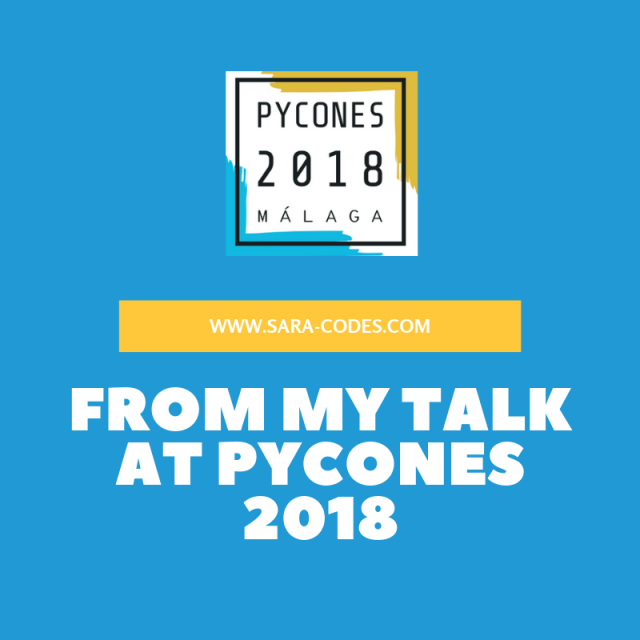In June 2019 I went to Thailand for the first time to give a talk at Pycon Thailand 2019. You should do it too.
For unknown reasons, I didn't write this blog post until now. It was mainly due to laziness I guess, but I decided to finally write it after reviewing some of the photos that I took from my trip to Bangkok.
The international community for the Python programming language holds several conferences (PyCons) each year. PyCons are hosted all around the world, mostly organized by volunteers from local Python communities. —https://pycon.org/
I can't recall the exact date when I saw the Call for Papers (CFP) for Pycon TH 2019 in Bangkok. I always wanted to visit Thailand, so I said to myself "wouldn't be awesome to travel to Thailand and give a talk at Pycon at the same time?"
Of course, I felt underqualified, but I wasn't going to lose anything with trying, so I prepared the abstract and description of my proposed talk about Class imbalance in Machine Learning, a topic that I recently had to deal with during one of the coursework of my master's.
I went out of this world when I got notified that my talk had been accepted (hurra!). I rapidly started all the preparations for the trip, which included the visa, which to my surprise, it was a speedy procedure.
I was lucky enough to have some savings at that time, but I was not too worried, since the organizers of Pycon Thailand had a budget for the speakers who were in need of financial aid to make it to the conference, which was going to be reimbursed at the day of the conference.
A flight ticket from my home country, Guatemala, would have cost me around $2500 (Impossible to pay being a broke student) but since I was in England at that time, it cost me less than $500. The hotel, transportation, and meals for the conference were already covered, so I just had to pay for the visa and the flight ticket, which was going to be reimbursed.

I arrived a day before my talk. I remember how much my tropical body was desperate for sun and warm weather after almost a year in England, so traveling to Bangkok was a needed break.
I was so excited about finally visiting Thailand, that I got super nervous only about an hour before my talk (I usually panic from the day I know I will be in front of an audience). There were two or three simultaneous tracks, so I wasn't expecting a lot of attendees. To my surprise, there were around 50 persons who came to my talk. I was dead.
Long story short, I delivered quite poorly. Some of the attendees said to me that I did OK, but you can see for yourself. Bear in mind that I spent around ten minutes on technical issues, so I couldn't cover all of the topics that I had prepared.
The PyCon was very well organized. I could spend a year writing on how good it was. From the venue to the swags, everything was perfectly taken care of. I even had the chance of meeting Adam Paszke, one of the authors of PyTorch, Katie McLaughlin, former director of the PSF, and David Cournapeau, the original author of scikit-learn, the keynote speakers of the conference. My only 'complain' was the food, which was actually a piece of art, super delicious and varied. Everybody at the conference enjoyed it. Unfortunately, I discovered that I can't tolerate the smell of fish sauce, which seems to be a common ingredient in thai food. For the ones who want to know what that smell is like, well, it's like a rotten corpse or pee kind of smell. It is really disgusting, but apparently not for the majority of tourists that I saw eating. I guess that if you're fine eating blue cheese, then you don't need to worry. But If you're sensitive to strong odors like me, I suggest that you ask the cook not to put fish sauce in your food.
I was very impressed at the python community in Thailand, which is large and vibrant. At the end of the conference, there was an after-party with plenty of food and live music performances, and karaoke. There I got to know some of the Pythonistas at the conference, all of them very welcoming and friendly.

Here I don't want to lose the focus of this post, which is to encourage you to do public speaking, especially at PyCon. I can't stress enough in saying that you don't need to be an expert of any kind to be a speaker. And if you're like me who thinks that you'll suck, please don't. I swear that no one is worse than I am at public speaking. That person simply does not exists. So if you're afraid of your attendees to think you're a fraud when they listen to you, remember that I am by all means worse than you 😉.
What do you need to speak at a PyCon?
Well, not much really. I'd say that if you think you have something to talk about, then you're good to go. You definitely don't need to be an expert. You can be a high school student, a fresh graduate, an early career professional, or a senior developer. It doesn't matter, and no one is expecting that you know all. That's why I love to go to PyCons, you can find world-famous developers and people who don't know code sharing the same microphone.
How do you find CFP's for PyCons?
What I usually do is follow the Twitter accounts of PyCons that I might be interested in speaking at, so I know when they open CFP. For instance, PyCon US, PyCon Spain, PyCon Africa, PyCon India, and PyCon Latam are just a few that you could check on regularly.
Another place that I use to look at CFP's is PaperCall.io, although there are a lot more similar websites to find events and tech conferences, such as CFP Land and SeeCFP, although I personally haven't used them. Phil Nash wrote a good article on How to find CFP for developer conferences here, you should definitely check it out.
Usually, each PyCon provides a guideline on how to write a good proposal, all of them are good, but I find the one of PyCon UK very friendly, which you can check here, and also a list of examples of failed and successful PyCon talk proposals by Brandon Rhodes here.
To summarize, I enjoyed every time at PyCon Thailand. It was by far the best PyCon I have been to, which was possible thanks to the organizers who accepted my proposal and in the first instance because I overcame my fears and impostor syndrome. I invite you to do the same, I can say, by my own experience, that it always pays off! 🙂



